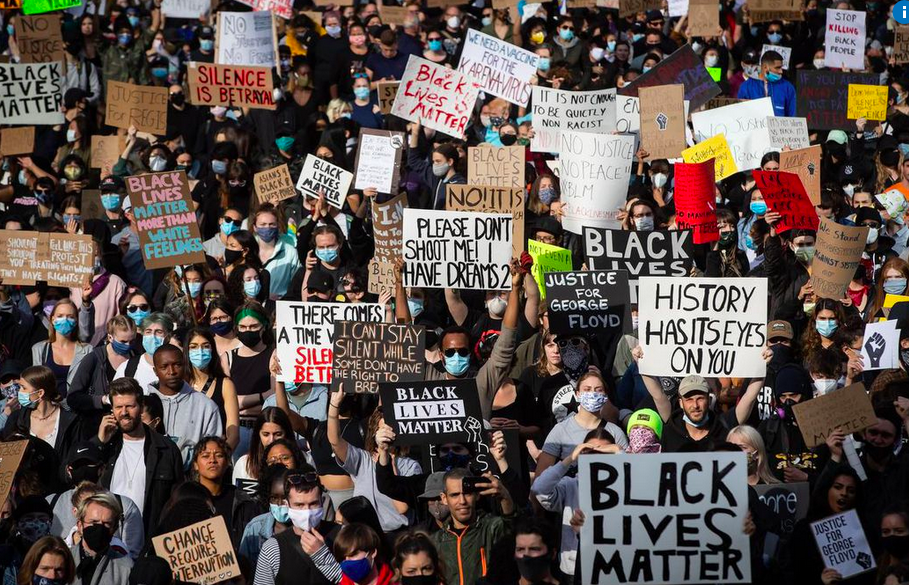Systemic Racism is Not a Sasquatch
In the narrative-warfare crucible of our current political moment, questioning systemic racism is the new climate denial.

Lisa Van Dusen
June 19, 2020
As the murder of George Floyd in Minneapolis on May 25th has given birth to a modern uprising for racial justice, one peculiarly antideluvian notion has spannered the spokes of the constructive public dialogue we all knew would be forthcoming as we white people rose to the occasion and began engaging in the uncomfortable conversations demanded of racial progress.
You may have been discombobulated by a sneaking sense of déja vu lately based on the parade of public figures — including and most notably politicians — being asked to confirm or deny the existence of something. This time, it’s not climate change, whose existence for years was confirmed or denied by the subjective opinions of politicians rather than accepted as fact based on the overwhelming preponderance of scientific evidence.
This time, the status of mythological Sasquatch has been assigned, for the purposes of manipulating the public discourse, to systemic racism. Like climate change, systemic racism has been chronicled, tracked, witnessed, measured, experienced and observed as a fundamental fact of life. In the case of systemic racism, as opposed to climate change, the phenomemon in question has been indisputably evident for centuries. It defined the economically driven, racially-rationalized barbarism of slavery for 250 years, it continues to define a socioeconomic reality in many countries including Canada, and it is not a question, a mystery or an elusive, electively acknowledged enigma to the people whose lives are defined by it daily. Ironically enough, this makes the denial of systemic racism a symptom, a force multiplier and a perpetuator of…systemic racism.
The emphasis on demanding that public officials confirm or deny the existence of systemic racism may seem, on the surface, to be productive when in fact it only reinforces the notion that racism is in the eye of the beholder rather than the target, a particulary silly proposition when the beholder is a white person.
Since white people don’t actually experience systemic racism, asking them to opine on its existence is like asking men whether misogyny is a problem or straight people whether homophobia persists. Systemic racism is collectively perpetrated by white people, so unless we’ve chosen to either acknowledge our role in the system that produces it and/or take the word of Black people who’ve been dealing with it for centuries at logical face value, some of us may have an operational or psychological conflict of interest on this question. Above all, the answer may tell you something about the respondent, but the implication that the answer is materially relevant says more about the environment in which the question is being asked.
Right now, that environment is informed by recent events that have dramatized and overwhelmingly reinforced the existence of systemic racism the way a category 5 tropical cyclone in Iqaluit would lend undeniable, anecdotal credence to the exitence of climate change. Because both climate change and systemic racism are subject to the narrative warfare ministrations of interests — political, industrial and other — who benefit significantly from protecting the status quo, such events tend to provoke a propaganda backlash.
Making what should be a renewed conversation about race and the reform of the structural scaffolding of laws, regulations and norms that keeps systemic racism in place, instead of about whether the problem of systemic racism even exists at all is a way of precluding change by playing for time and paralyzing progress.
It’s also a diversion from that authentic “uncomfortable conversation” that should be taking place about not whether systemic racism exists, but about what it does to people, how we white people contribute to it — passively and actively, consciously and subconsciously — in ways that serve to maintain a massive lie that never made sense and that damages all of us. Avoiding that conversation is beginning to look even more ridiculous than other forms of denialism.
Lisa Van Dusen is associate editor of Policy Magazine and a columnist for The Hill Times. She was Washington bureau chief for Sun Media, international writer for Peter Jennings at ABC News, and an editor at AP in New York and UPI in Washington.
